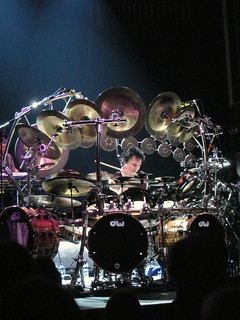 By Joel Resnicoff (died 1986), showing mannequin he designed as artist. [FAL], via Wikimedia CommonsSo we hear it all the time in workshops and in blog posts from agents and editors--don't write to the trend, write what you love.
By Joel Resnicoff (died 1986), showing mannequin he designed as artist. [FAL], via Wikimedia CommonsSo we hear it all the time in workshops and in blog posts from agents and editors--don't write to the trend, write what you love.
Why? Because at the rate publishing moves, that thing that's the trend now was bought probably two years ago. With the age of digital publishing and self publishing, this has a little more flexibility because stories can get turned around more quickly. But even so, most of the time when something "hits big", if you don't already have a manuscript close to finished, you're probably already too late.
We see it happen all the time. Twilight exploded then all of a sudden every book on the shelf was about vampires. Then we got a little burnt out on vampires, so "ooh angels!" that's totally different. And soon we tired of angels. Then shapeshifter werewolves, weretigers, werehampsters were popping up (okay, maybe not hampsters.) Then we're over that.
Same thing has been happening with dystopian. Hunger Games busted open the dam, then all these YA dystopians flooded the market. And now I'm hearing people say, love The Hunger Games but, ugh, I'm getting so burnt out on dystopian.
The market ebbs and flows and certain things are going to spike. The ones that get to ride that wave of a trend are usually people who were already writing that kind of book before the trend became a trend. Their books were already lying in wait, complete and ready to go once a publisher took interest. All the others who scrambled to start writing to the trend end up with a manuscript that's ready when the popularity is starting to wane.
We're on the cusp of a new trend as we speak. If you haven't been living in a cave for the last two weeks, the book Fifty Shades of Grey has been on all the major news programs and is popping up everywhere. This book is BDSM erotic romance. It's what I write. Now, had you told me a month ago that my little niche genre would all of a sudden become the talk on the Today show and Good Morning America and that an erotic romance was going to hit #1 on the New York Times, I would've laughed. I mean, are you kidding? Most people don't even know what BDSM is, much less that there are romances about it.
But wham, there it is, everyone is talking about it. My agent is getting calls from editors wondering if she has any BDSM romance to shop, audio rights people are calling to see if she has any BDSM books they can look at, film rights people are suddenly open to looking at those kinds of books. It's craziness.
Now I don't know how far all this exposure for the genre will go--I hope very far, obviously. But all of a sudden, I'm writing something "trendy". How the eff did that happen? I'm NEVER up with the trend for anything, lol.
But here's the lesson: I wrote the books I wanted to write. I wrote stories I was passionate about. I didn't write a BDSM story because it was the "thing". It wasn't the thing. But now when a trend is starting to explode, I have four books coming out right in the middle of it. Now, that may not affect my series' success at all, but damn, it can't hurt, right? : )
So write what you love. If that's something that's a trend right now (say you love writing dystopian), that's fine. If you are passionate about it, that's going to come through and hopefully stand out amongst a crowded shelf. For instance, there are still people writing about vampires and doing well because the stories are good and they are passionate about the topic.
But if what's "hot" right now is not your thing, don't try to write it to get a piece of that trend. You'll probably be too late and the lack of authentic passion will shine through. It will feel like an imitation.
And if what you love is not "trendy" right now, go for it anyway. Maybe you'll be the trend setter. (Ask Nirvana or Pearl Jam who started their style of music when all the other rock bands were wearing spandex and Aquanet). Or maybe you'll get lucky like me and something in your genre will break out unexpectedly, and you'll be ready to be part of the wave.
So what are your thoughts on trends? Do you write in a "trendy" genre or are you writing something not so popular? What trends have you grown tired of?
 Parisian Love Lock Photo by Allen Skyy (click photo for link)
Parisian Love Lock Photo by Allen Skyy (click photo for link)

